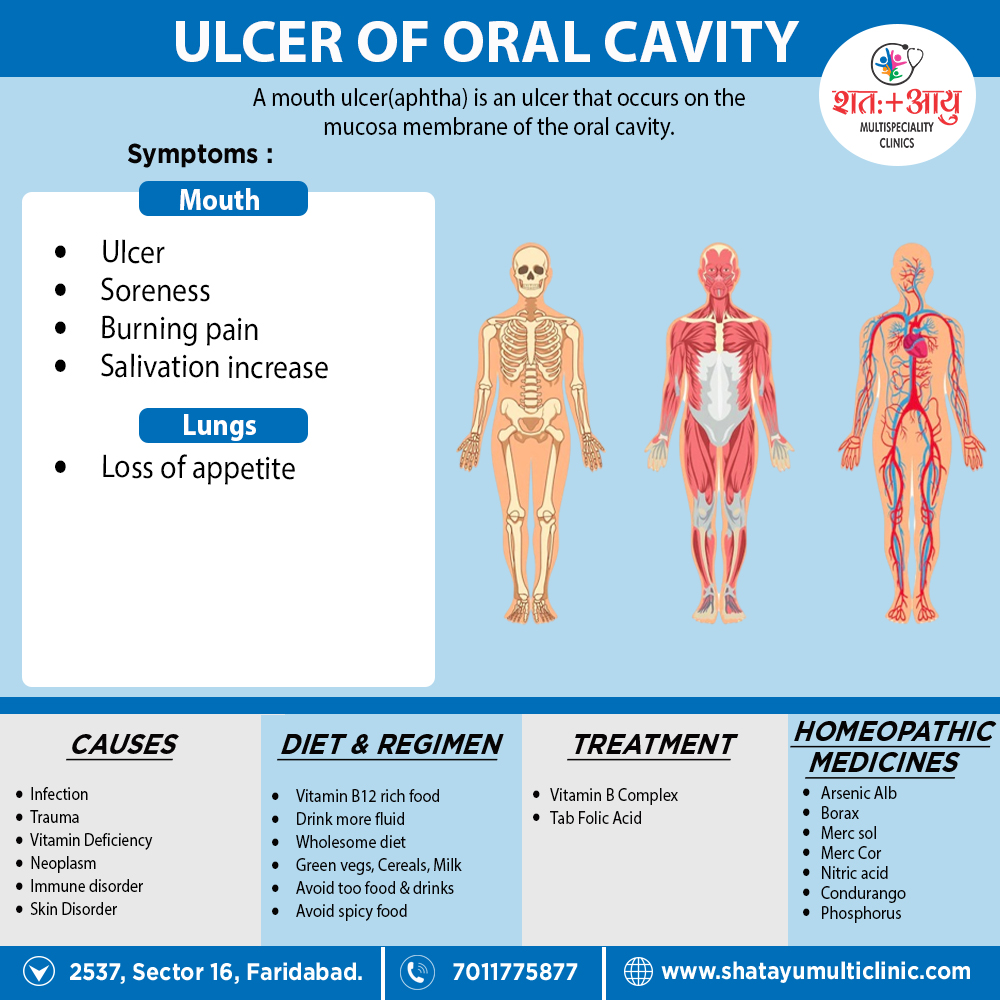Definition of Ulcer of Oral Cavity
A mouth ulcer (aphtha) is an ulcer that occurs on the mucous membrane of the oral cavity.[1]

A mouth ulcer (aphtha) is an ulcer that occurs on the mucous membrane of the oral cavity.[1]
Mouth ulcers are very common, occurring in association with many diseases and by many different mechanisms, but usually there is no serious underlying cause.
Rarely, a mouth ulcer that does not heal may be a sign of oral cancer. These ulcers may form individually or multiple ulcers may appear at once. Once formed, an ulcer may be maintained by inflammation and/or secondary infection.
The two most common causes of oral ulceration are local trauma and aphthous stomatitis condition characterized by recurrent formation of oral ulcers for largely unknown reasons.
Mouth ulcers often cause pain and discomfort and may alter the person’s choice of food while healing occurs. [1]
(a) Viral- e.g. Herpangina, herpes simplex hand, foot and mouth disease
(b) Bacterial- e.g. Vincent infection, TB, syphilis
(c) Fungal- e.g. Candidiasis
(a) Physical- e.g. Cheek bite, jagged tooth, ill-fitting denture
(b) Chemical- e.g. Silver nitrate, phenol, aspirin burns
(c) Thermal- e.g. Hot food or fluid, reverse smoking
Homeopathy treats the person as a whole. It means that homeopathic treatment focuses on the patient as a person, as well as his pathological condition. The homeopathic medicines selected after a full individualizing examination and case-analysis.
which includes
A miasmatic tendency (predisposition/susceptibility) also often taken into account for the treatment of chronic conditions.
A homeopathy doctor tries to treat more than just the presenting symptoms. The focus is usually on what caused the disease condition? Why ‘this patient’ is sick ‘this way’?.
The disease diagnosis is important but in homeopathy, the cause of disease not just probed to the level of bacteria and viruses. Other factors like mental, emotional and physical stress that could predispose a person to illness also looked for. No a days, even modern medicine also considers a large number of diseases as psychosomatic. The correct homeopathy remedy tries to correct this disease predisposition.
The focus is not on curing the disease but to cure the person who is sick, to restore the health. If a disease pathology not very advanced, homeopathy remedies do give a hope for cure but even in incurable cases, the quality of life can greatly improved with homeopathic medicines.
The homeopathic remedies (medicines) given below indicate the therapeutic affinity but this is not a complete and definite guide to the homeopathy treatment of this condition. The symptoms listed against each homeopathic remedy may not be directly related to this disease because in homeopathy general symptoms and constitutional indications also taken into account for selecting a remedy.
A mouth ulcer (aphtha) is an ulcer that occurs on the mucous membrane of the oral cavity.
References: